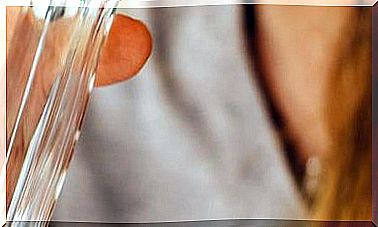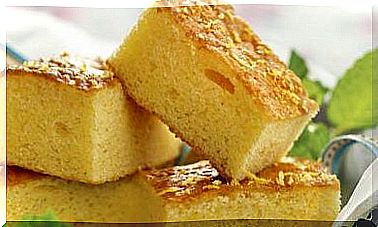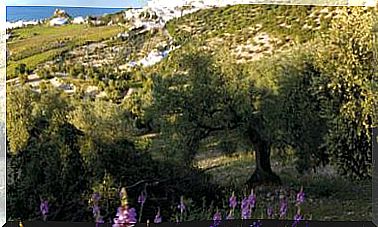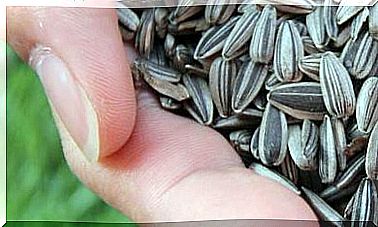Kidney Stones And Grit: Prevent And Treat Them Naturally
Suffering from kidney stone colic causes excruciating pain. Some measures help you to remove the grit, undo the stones and prevent colic.

The kidneys are the organ in charge of filtering and eliminating waste substances and excess fluids from the body. One of the most common conditions of the kidneys is renal lithiasis or the formation of grit and kidney stones or stones. Some measures such as drinking plenty of fluids and herbal medicine as a natural treatment can be of great help in preventing it and avoiding the dreaded, painful, renal colic.
Grit or kidney stones: what are they and how do they form
The sand and stones are formed when, through the fine terminal pipes of the urinary system, fluids loaded with certain substances, especially calcium, are eliminated.
In fact, kidney stones are usually calcium and are deposited the same as calcifications, like in the washing machine. Up to 12% of people suffer or will suffer from kidney stones or grit at some point in their life. In general, it seems common for people who drink little water to suffer from it.
This formation of grit and stones in the kidney is known as lithiasis. They are usually formed in the renal cavity or pelvis, and there they grow for years or even decades. At first they are very small: a grit forms in the kidney, which usually remains stationary. But then those grains of grit can grow and, as they grow, form what we call stones or kidney stones.
The causes of stones appear are many and depend on the type: some are due to dietary excesses, others due to kidney deficiency, and some due to genetic causes. In fact, it is speculated that the decisive factor is genetics, but the stones are more common in sedentary people who take a lot of calcium, drink little or sweat excessively, which in the end is the same for the kidney.
Symptoms of grit and kidney stones
There comes a time when kidney stones can reach a size that makes it impossible to expel them through the fine ureteral ducts without suffering renal colic.
Therein lies the main difference between stones and arenill a: in the size and the symptoms they cause.
- The grit usually produces a dull pain or discomfort in the kidney area, without colic characteristics, and can be gradually eliminated.
- Instead, the stones can block the passage of urine and dilate the urinary tract. When the body tries to expel them, by not fitting through the tubes that go from the kidney to the bladder, they can cause colic. Colic is characterized by an abrupt and sharp pain, which can occur higher or lower depending on the point at which the stone is causing the obstruction.
Not all kidney stones are the same. Depending on its composition, we can establish different types of kidney stones. Knowing what type of stones you have can help you prevent them and fine-tune the treatment:
• Calcium phosphate : They are very common and can improve with diuretic plants and by reducing calcium-rich foods (especially dairy) and carbonated drinks (rich in phosphates).
• Calcium oxalate: Their edges make them very painful, especially if they grow, and they are the most frequent.
• Urate: Due to excessive consumption of animal protein or kidney failure, they account for 10% of kidney stones. They are formed mainly with acidic urine.
• Magnesium ammonium phosphate or struvite: These are stones often caused by recurrent kidney infections.
• Cystine: Uncommon, they are linked to a metabolism defect.
Depending on the type of calculation, the diet will have to be individualized. Of course, most have calcium and all benefit from drinking more fluids.
How to prevent and get rid of kidney stones and grit
Drinking lots of fluids is the best prevention. Low mineralized water is the most important diuretic and infusions are your allies. If you have a tendency to produce grit or kidney stones, or already have them, follow these tips:
- Drink at least 2 liters a day of low mineralized water, more in case of colic or kidney discomfort. Diuretic and antispastic infusions are also ideal.
- Take the juice of one or two lemons a day regularly or seasonally. It can be useful, especially in phosphate and oxalate calculations. Urate, cystine, or oxalate stones are increased in acid urine; not so those of phosphate. However, all of them benefit from the consumption of citrates present in lemon juice, which regulate urinary pH and favor the solubility of calcium salts in urine.
- Cut down on foods rich in calcium (especially dairy).
- If you have urate stones, so do cold cuts, meat, shellfish, and concentrated proteins.
- If they are oxalate, also reduce these vegetables: spinach, chard, beets, cocoa, rhubarb, tomato, pistachios and peanuts.
- A good vegetable broth provides you with fluids and, if you do it with a lot of celery, leek and onion, you increase its diuretic power. Add little or no salt, as it retains fluids and reduces urination.
- Take 1 or 2 tablespoons of cider vinegar a day, with food or diluted in water. It gives you citrates.
- Magnesium helps to solubilize the grits, especially if it is taken in the form of magnesium citrate: 200 mg a day one or two months, once or twice a year. It can prevent the formation of calcium stones.
- Include plenty of raw, stewed or boiled parsley in your dishes. Both the leaves and the seeds are used, whose diuretic action, similar to that of celery, is due to its apiol and flavones.
4 very useful diuretic plants
In addition, these four plants with a diuretic effect may be useful:
- Buchu ( Barosma betulina ): This South African plant is clearly diuretic. The leaves are taken as an infusion, alone or combined with bearberry, horsetail or corn stigmas.
- Dandelion ( Taraxacum dens leonis ): The root is used, and also the young leaves in salad. It is very diuretic, useful against gallstones and kidney stones, edema and fluid retention.
- Bean pod ( Phaseolus vulgaris ): The dried bean pod, diuretic and glucose regulator, are used. The boiled green bean also helps: eat it and use the cooking broth.
- Bearberry ( Arctostaphyllos uva-ursi ): Its leaves are rich in hydroquinone glycosides, with urinary antiseptic and diuretic action. Gives a discreetly dark color to urine.









